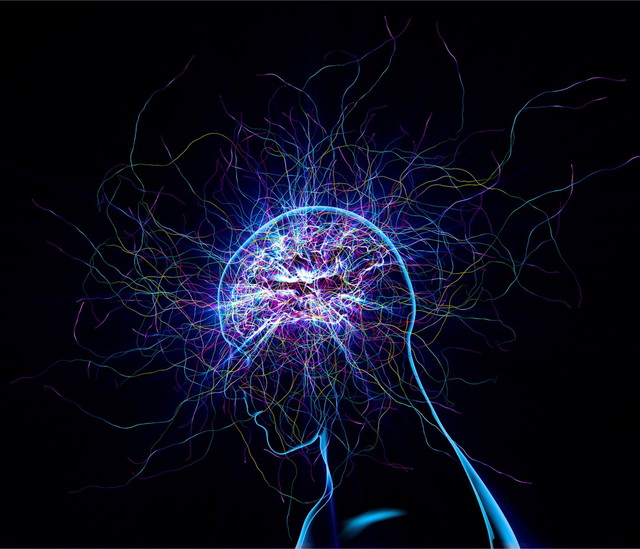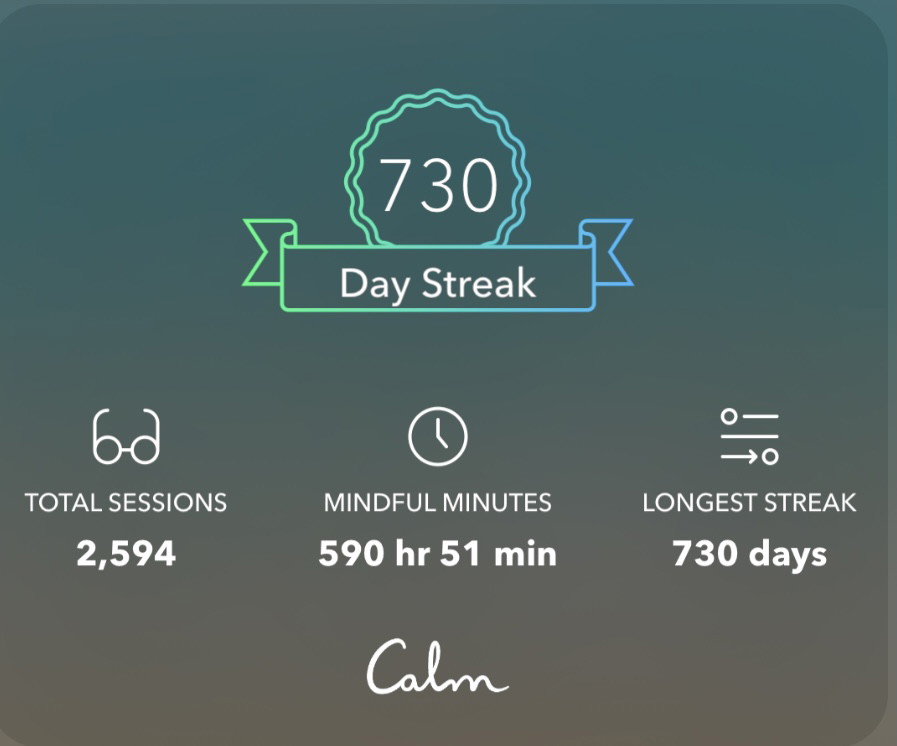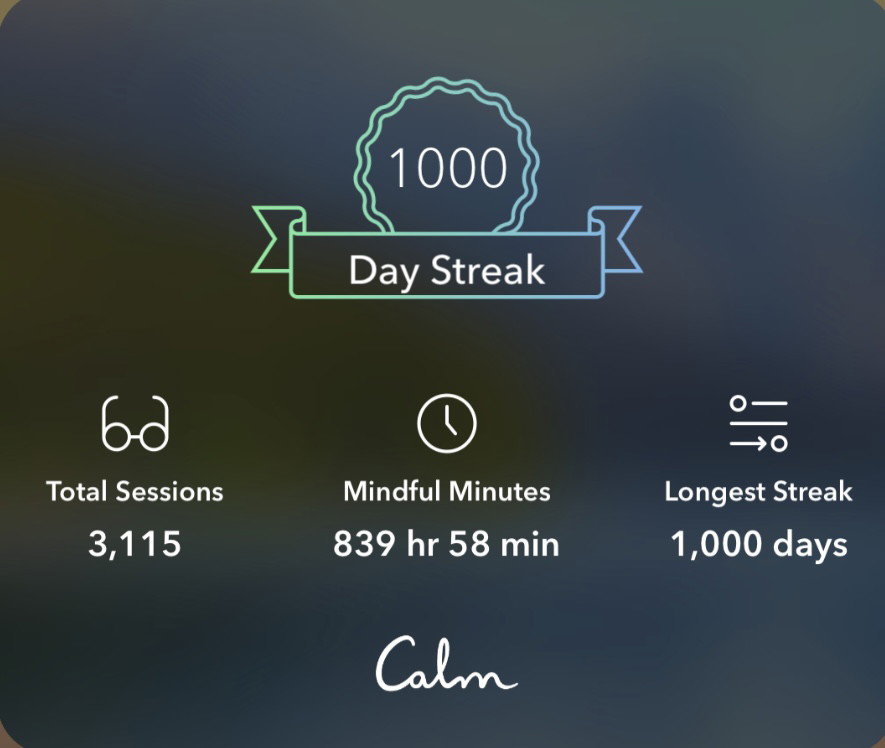This is Your Brain on Meditation
This is Your Brain on Meditation
by Bobby Rock
I believe a consistent meditation practice is one of the most important mind/body activities we can establish for lifelong health and wellbeing. This week, I finally hit that elusive milestone of 365 consecutive days of it. I’ve had a practice since the late 80s and I’ve been using this Calm app for the past few years, mainly for my shorter medi sessions. It has this feature where it automatically tabulates how many days in a row you’ve meditated, for example: “10 Day Streak.” On one hand, missing a day here or there probably doesn’t matter much. But on the other hand, I figured, it certainly couldn’t hurt to aspire to something like a 365-day streak.
And so my journey began. I would get a few weeks under my belt, and then… "OH SHIIIIIT!" I would miss a day. But on my b-day last year (7-13), I said, “Fuck this. I’m going all the way this time.” And sure enough, that magical 365-day moment arrived on Monday morning.

Did it all matter? Yes. I do believe the DAILY connection time has made a difference—even as the quality of each session can vary radically. Let’s look at a few reasons why:
1) My ability to quickly drop into a focused state of concentration has improved:
As I’ve written about extensively through the years, our ability to concentrate is one of the greatest skills we could ever develop in life, because it involves focusing the mind, and melding with the present moment. But we live in a scatterbrained, multitasking culture of multiple screens and digital distraction where, in reality, we are all practicing the exact opposite of concentration, virtually every moment of every day.
Meditation can be the great equalizer because, when it comes to the practice of relaxed concentration, it’s kind of like weightlifting for the brain. As we engage the “resistance” of blocking out all those thoughts (“like a cluster of ants on a plum pit,” I once wrote), over time, our minds get stronger.
2) There appears to be a closer connection to that “space between thoughts” where new ideas and epiphanies bubble up:
It’s important to clarify, however, that meditation hardly ever facilitates any kind of “supernatural" experience, where genius ideas suddenly come pouring out of you. What can happen, though, is that meditation can gradually clear the clutter from your mind, so those genius ideas that have already been percolating in your noggin can finally find a little space to bubble forth! So, typically, you’ll struggle through a 10 or 20-minute session—which can often feel like a lost battle in terms of truly quieting the mind—but then, four hours later… boom: You are pulling out the journal, notepad, or voice memo app to record something profound, important, or even life-changing. Happens all the time and, I insist, more often when you "weed the mental garden” through a regular meditation practice.

3) My practice of the primary tenets of mindfulness (as I see them) seems sharper and more consistent:
A) Awareness of the present moment through breath: Most of our suffering occurs from regret about the past or anxiety about the future. Consciously zeroing into the present—if only for a few moments—offers us a reprieve from our “monkey mind” obsessions about events or perceptions from the past or future. "Breathe in…. Breathe out… I am here, in this extraordinary moment in time, that has never been nor will ever be again. All is well."
B) The observer’s daily practice of non-judgment and non-attachment: If we can control our thoughts, we can avoid these knee-jerk, emotionally-charged reactions that tend to color our perceptions and send us down regrettable rabbit holes of dramatic chaos. Meditation helps us see things more as a neutral, impartial “observer” of events, where our petty, lizard-brain judgments can be set aside in favor of more mindful, clear-headed observation. This is a gift… both to us and those around us. It enables us to experience, evaluate, and perceive things in a much more objective, nuanced, and multi-dimensional way.
C) Additionally, non-judgment assists in detaching from outcomes and other forms of non-attachment (which is a hallmark of all the great religions, most notably Buddhism). But there is one other aspect of meditation and mindfulness I wanted to mention here: the practice of connecting to one’s inner Life Force. I know this might sound a little “woo-woo new agey” to some, but it’s a real thing. If your heart is beating, you are alive. If you are alive, you are infused with… that thing… that intangible energy that connects all living beings to each other and, perhaps most notably, to that Divine source of creation, whatever you believe it to be. Different cultures call it different things: Life Force, Chi, Prana, Vijñāna, Holy Spirit, or in the world of quantum physics, simply Energy. But it’s all the same thing in my book, and your personal connection to your own is absolutely invaluable. (More on this another time…)
D) The ongoing cultivation of the “gratitude filter:” Once you get in a groove of practicing the non-judgment and non-attachment thing, and you find yourself in a consistent space of neutrality, then a meditation practice can help to reinforce what I believe is a worthwhile “default” filter with which to perceive life: gratitude. Hey, if you are alive on planet earth these days, it is a good time to be around, almost no matter where you live. Yes, there will always be problems, challenges, and setbacks that we must overcome, both individually and collectively. Always. But there has also never been so much opportunity to “follow your bliss” and drink in the beauty and wonder all around us. Always. And I believe a grateful mindset brings us back to the enlightened simplicity of such a notion. We all have a hell of a lot to be grateful for… we just have to take a little time each day to remind ourselves. Spending a part of your meditation time reinforcing these things gets you in the habit of assimilating life’s events through the filter of gratitude.
These are just a few of the key observations from the last year that popped up for me. Obviously, there is a ton more to talk about regarding the actual practice of meditation, so let’s pick it up again soon….
Addendum One:
So today, we hit the two-year mark!

Certainly, not every meditation session is a transcendent experience... but neither is every workout or practice session. But I do believe there is something about just showing up every day that's much better than NOT showing up every day. I find that structure in a meditation practice can be just as beneficial as structure in any other endeavor, like practicing, running, hitting the weights, or writing.
And, just like anything else we practice, we’re gonna see improvements. To that end, I’ve always thought of meditation like weightlifting for your brain. Little by little, you strengthen your mind and are able to bring a lot more intentionality into your life, as far as: controlling what kinds of thoughts and inner dialogues you let linger in your mind and which ones you gently escort the hell out, how quickly you tend to react to “unfavorable” happenings, and how effectively you can mitigate the inner-chatter, especially when it’s time to concentrate—like during a medi session. I find all of these skills to be quite useful!
I’ve also noticed this past year that when I defer any big responses or decisions to post-meditation time vs. the sooner-rather-than-later knee-jerk approach, I’m always happy I did. Typically, I find that whenever we react and/or make decisions when we’re either stressed, angry, or a bit worried, we tend to default to the ol’ fight-or-flight "lizard brain" part of our consciousness and… let’s just say… that’s not exactly the locale where our most mindful and constructive thinking takes place.
Onward to the next plateau: 1000 days
Addendum Two:

Over the past three months, I’ve had occasion to test my mindfulness practice a bit more regularly since becoming a first-time dad. Obviously, it is a joyous experience. At the same time, aspects of caring for a new human can be challenging, especially as sleep becomes compromised and fatigue sets in. I knew this was coming, so my goal was to just practice remaining calm and present, even when feeling fried. I figure, if I can’t do this, then what the fuck has all of this meditation practice been about? (Anyone can be “Zen” when life is tranquil and easy.) Isn’t my mind strengthening from my practice? If so, shouldn’t I be able to utilize this new strength by maintaining a sense of calm, even when I’m really burnt? I say yes.
And yet, I also acknowledge that, while meditation helps, there will still be an occasion here or there where maybe I fall a bit short in the patience department. But the idea is, I should be able to “be of strong mind” most of the time, and this remains my daily commitment… and yet another reason why daily practice is so important.
Next stop: Three consecutive years of meditation this summer.
